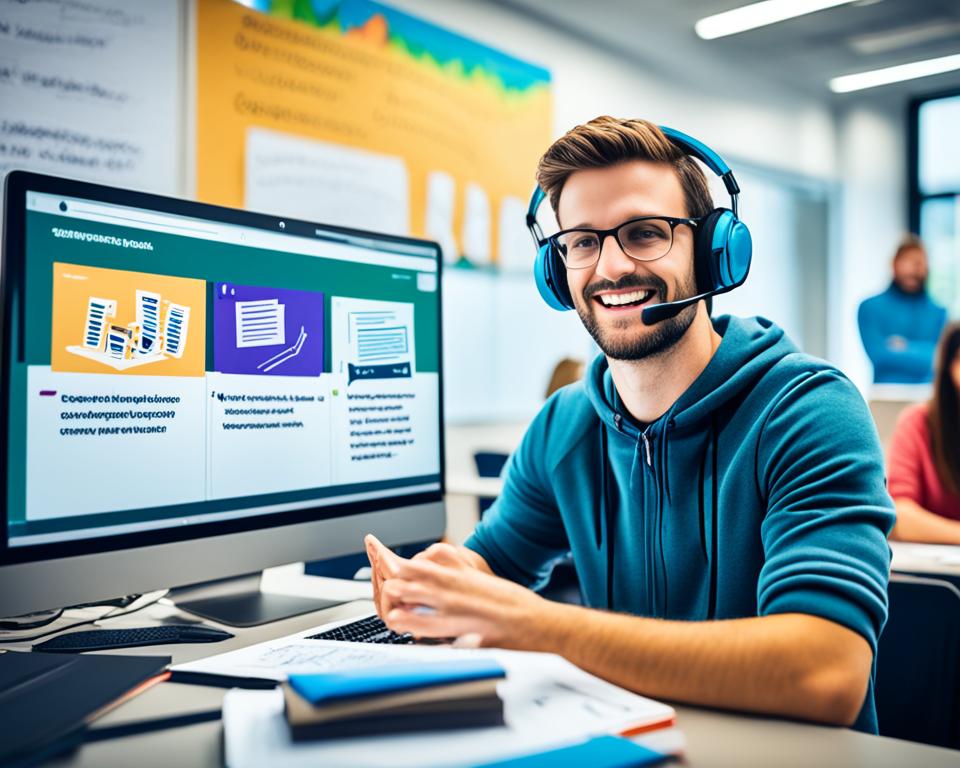Design Online Workshops have revolutionized the field of remote training and online learning. In today’s digital age, virtual workshops provide an interactive and engaging platform for participants to enhance their skills and expand their knowledge. Whether you’re a trainer, educator, or professional looking to captivate your audience and deliver effective online workshops, mastering the art of design is crucial.
Key Takeaways
- Design Online Workshops provide a flexible and convenient option for virtual training and learning.
- By incorporating multimedia elements and interactive activities, you can create engaging and dynamic online workshops.
- Using interactive tools and technologies, such as video conferencing platforms and collaboration tools, enhances participant engagement and collaboration.
- Effective facilitation and communication skills are essential for creating a positive and productive online workshop environment.
- Continuous assessment, feedback, and improvement are key to maximizing learning outcomes and staying up to date with the latest trends in designing online workshops.
The Benefits of Online Workshops
Online workshops provide numerous benefits compared to traditional in-person training. Whether you are a learner or a trainer, virtual training offers a flexible and convenient way to acquire new skills or deliver educational programs. Here are some key advantages of online workshops:
Flexibility
One of the major benefits of online workshops is the flexibility they offer. Participants have the freedom to learn at their own pace and can access the workshop materials from anywhere in the world. This eliminates the need for travel and allows individuals to fit their learning around their personal and professional commitments.
Interactive Learning Experiences
Virtual training platforms enable interactive learning experiences that engage participants in various ways. Online workshops can incorporate multimedia elements such as videos, visuals, and audio to enhance the learning process. Moreover, participants can engage in collaborative activities, discussions, and real-time feedback, creating an immersive and interactive learning environment.
Cost-effectiveness
Online workshops are often more cost-effective compared to traditional in-person training. There are no expenses associated with travel, accommodation, or venue rentals. Additionally, online workshops can reach a larger audience, reducing the cost per participant and making it a more affordable option for both learners and trainers.
Time Efficiency
With online workshops, participants can save time by avoiding commuting or taking time off from work. They can access the workshop materials and complete the activities at a time that is most convenient for them. This time efficiency allows for a more balanced approach to learning and enables participants to fit their training into their busy schedules.
Overall, online workshops provide a flexible, interactive, cost-effective, and time-efficient approach to training and skill development. Whether you are looking to learn new skills or deliver educational programs, virtual training offers a range of benefits that can enhance the learning experience for both learners and trainers.
| Benefits of Online Workshops |
|---|
| Flexibility |
| Interactive Learning Experiences |
| Cost-effectiveness |
| Time Efficiency |
Design Principles for Online Workshops
When it comes to designing online workshops, incorporating design principles is essential to create an engaging and visually appealing learning experience for your participants. By following these principles, you can ensure that your online workshops not only grab attention but also provide a seamless user experience that promotes active engagement.
Layout and Organization
Consider the layout and organization of your online workshop content to make it easily accessible and visually appealing. Use clear headings and subheadings to organize the different sections of your workshop. Break up large blocks of text into smaller paragraphs to improve readability. Emphasize key points or important information using bullet points or numbered lists.
Visual Engagement
Enhance the visual appeal of your online workshop by incorporating visually engaging elements such as images, videos, and infographics. These elements not only break up the text but also help participants grasp concepts more easily. Use relevant and high-quality visuals that support the content and reinforce the key messages you want to convey.
Did you know? Research shows that visuals can improve learning and retention by up to 400%.
Interactive Activities
Promote engagement and active learning by including interactive activities in your online workshops. These activities can range from quizzes and polls to group discussions and virtual breakout rooms. By encouraging participants to actively participate and interact with the content and each other, you create a more immersive learning experience that enhances knowledge retention.
User Experience
Ensure a positive user experience for your workshop participants by focusing on navigation, clear instructions, and responsive design. Create a user-friendly interface that is easy to navigate, allowing participants to access different sections of the workshop effortlessly. Provide clear instructions for activities and assignments, ensuring participants understand what is expected of them. Lastly, optimize your workshop for different devices, ensuring a seamless experience across desktops, laptops, and mobile devices.
To further understand the importance of design principles in designing online workshops, take a look at the following table:
| Design Principle | Benefits |
|---|---|
| Layout and Organization | Improves readability and facilitates information processing |
| Visual Engagement | Enhances understanding and retention of key concepts |
| Interactive Activities | Promotes active engagement and application of knowledge |
| User Experience | Ensures seamless navigation and clear instructions |
By applying these design principles to your online workshops, you can create a visually appealing and user-friendly learning environment that maximizes participant engagement and knowledge retention. Remember, effective design principles are the key to unlocking the full potential of your online workshops.
Effective Content Creation for Online Workshops
Creating content that is informative, relevant, engaging, and multimedia-rich is essential for designing online workshops that captivate and educate participants. By employing effective content creation strategies, you can ensure that your online workshops provide value and knowledge to learners.
Identify Learning Objectives
Before diving into content creation, start by clearly identifying the learning objectives of your workshop. This will help you stay focused and ensure that your content addresses specific goals and outcomes. By aligning your content with the desired learning objectives, participants will gain the most relevant knowledge and skills.
Craft Informative and Relevant Content
When designing online workshop content, prioritize information that is informative and relevant to participants’ needs. Conduct thorough research and gather valuable insights to provide accurate and up-to-date information. This will establish your credibility as a facilitator and create a meaningful learning experience.
Mix Text, Images, Videos, and Audio
Use a combination of multimedia elements to make your workshop content engaging and interactive. Incorporate text, images, videos, and audio to cater to different learning preferences. Visuals, such as diagrams and infographics, can help clarify complex concepts, while videos and audio recordings can provide additional context and bring content to life.
Include Real-life Examples and Case Studies
To enhance learning outcomes, incorporate real-life examples and case studies into your content. Relatable scenarios and practical applications help participants understand how to apply the information they are learning. This approach fosters deeper engagement and encourages active participation in the online workshop.
Integrate Practical Exercises
Practical exercises are essential for reinforcing learning and promoting skill development. Design interactive activities that allow participants to practice what they learn in a hands-on manner. This could include group discussions, simulations, or problem-solving exercises. Practical exercises provide participants with the opportunity to apply newly acquired knowledge and enhance their understanding.
By focusing on effective content creation for your online workshops, you can deliver engaging and informative learning experiences. The use of multimedia elements, along with real-life examples and practical exercises, will help participants grasp concepts effectively and maximize their learning outcomes.

| Benefits of Effective Content Creation | Impact on Online Workshops |
|---|---|
| Enhanced participant engagement | Participants are more likely to actively participate and stay engaged throughout the workshop. |
| Improved knowledge retention | Participants are more likely to retain information when it is presented in an engaging and interactive manner. |
| Increased practical application | Well-crafted content that includes real-life examples and practical exercises promotes the application of knowledge in real-world scenarios. |
| Fostered collaboration and discussion | Engaging content encourages participants to collaborate, discuss ideas, and share insights, fostering a sense of community within the workshop. |
| Positive learning experience | Effective content creation contributes to a positive and impactful learning experience for participants, increasing their satisfaction and motivation. |
Interactive Tools and Technologies for Online Workshops
When it comes to designing engaging online workshops, incorporating interactive tools and technologies is essential. These tools not only enhance participant engagement but also foster collaboration and active learning. Utilize the following platforms and technologies to create dynamic and impactful online workshops:
Video Conferencing and Screen Sharing Platforms
Platforms like Zoom, Microsoft Teams, and Google Meet enable real-time video conferencing and screen sharing, allowing participants to connect and interact seamlessly. These platforms are versatile and provide the foundation for virtual communication and collaboration.
Interactive Whiteboards and Polling Tools
Enhance participant engagement by incorporating interactive whiteboards and polling tools. Interactive whiteboards enable real-time collaboration and visual demonstrations, while polling tools allow you to gather instant feedback and opinions from participants.
Breakout Rooms
Breakout rooms are invaluable for facilitating group work and discussions in online workshops. They provide participants with a dedicated space to collaborate and contribute to activities or projects. Breakout rooms promote active learning and foster teamwork among participants.
Online Collaboration Tools
Utilize online collaboration tools such as Google Docs or Miro to facilitate teamwork and document sharing. These tools enable participants to collaborate in real-time, create shared documents, and provide feedback, enhancing the collaborative nature of the online workshop.
By incorporating these interactive tools and technologies into your online workshops, you can create a dynamic and engaging learning experience. Participants will be able to actively participate, collaborate, and learn from one another, ultimately leading to a more impactful and effective workshop.
Engaging Participants in Online Workshops
Engaging participants in online workshops is essential for creating an interactive and dynamic learning experience. By implementing effective communication strategies and encouraging active participation, you can foster a collaborative environment that promotes engagement and knowledge sharing.
To engage participants in online workshops, encourage them to share their thoughts, ask questions, and actively participate in group discussions. This not only allows participants to contribute their insights but also creates a sense of ownership and investment in the learning process.
Utilize chat features, polls, and Q&A sessions to gather feedback and promote interactivity. These tools not only provide a platform for participants to express their opinions but also enable you to gauge their understanding and address any queries or concerns that may arise.
Breaking up the workshop into smaller segments or activities can help maintain participant engagement. Long periods of passive learning can lead to decreased attention and interest. By incorporating interactive activities, such as case studies, group exercises, or virtual simulations, you can promote active participation and reinforce the key concepts being taught.
Creating a Collaborative and Inclusive Environment
Creating a collaborative and inclusive environment is crucial for participant engagement in online workshops. Foster an atmosphere of respect and open communication, where every participant feels valued and encouraged to contribute.
“The power of online workshops lies in the collective knowledge and experience of the participants. Encourage a culture of active engagement, collaboration, and open dialogue to unlock the full potential of your workshop.”
Facilitate discussions that allow participants to interact with each other, share different perspectives, and learn from their peers. By promoting collaboration and exchange of ideas, you can enhance the learning experience and provide valuable networking opportunities.
Integrate breakout sessions or small group activities to encourage collaboration and teamwork. These sessions allow participants to work together, solve problems, and collectively explore the workshop topics, fostering a sense of camaraderie and connection.
| Strategies for Engaging Participants in Online Workshops: |
|---|
| Encourage active participation through discussions, questions, and sharing |
| Utilize chat features, polls, and Q&A sessions for feedback and interactivity |
| Break up the workshop into smaller segments or activities |
| Create a collaborative and inclusive environment |
Maximizing Learning Outcomes in Online Workshops
When designing online workshops, maximizing learning outcomes should be a top priority. By incorporating assessments, feedback, and reflection exercises into your workshop structure, you can ensure that participants gain valuable knowledge and skills from their online learning experience.
Assessments to Gauge Understanding
Assessments play a crucial role in determining participants’ understanding of the workshop content. Incorporate quizzes or assignments throughout the workshop to gauge comprehension and identify areas that may require further clarification. These assessments can be in the form of multiple-choice questions, short answer responses, or practical exercises.
Timely feedback is vital for participants’ growth and progress. Provide detailed feedback on their assessments, highlighting areas of strength and areas that need improvement. Offer suggestions for further learning resources to enhance their understanding in weaker areas.
Encouraging Reflection for Deeper Learning
Reflection exercises can significantly enhance the learning experience in online workshops. Encourage participants to reflect on the knowledge and skills they have acquired and how they can apply them to real-world scenarios. This self-reflection helps solidify learning and promotes deeper understanding.
Introduce guided reflection prompts, such as asking participants to identify the most valuable aspect of the workshop or their personal growth throughout the learning journey. This allows participants to internalize their learning, connect it to their own experiences, and derive meaningful insights.
Fostering Peer Feedback and Assessment
Incorporate opportunities for peer feedback and assessment to promote collaborative learning. Assign participants to provide constructive feedback to their fellow learners, encouraging them to share observations, suggestions, and praise. Peer feedback can provide diverse perspectives and create a supportive learning community.
Consider implementing peer assessment activities where participants evaluate each other’s work or presentations. This fosters a peer-driven learning environment and encourages participants to critically analyze and evaluate their peers’ achievements. Ensure clear evaluation criteria and guidelines are provided to ensure fair and accurate assessments.
By incorporating assessments, feedback, and reflection exercises in your online workshop design, you create a comprehensive learning experience that encourages active participation and deepens understanding. These strategies not only maximize learning outcomes but also empower participants to apply their newfound knowledge and skills confidently.
Adapting Online Workshops for Different Learning Styles
When designing online workshops, it is crucial to consider the diverse learning styles of your participants. By adapting your workshop to accommodate visual learners, auditory learners, and kinesthetic learners, you can create an inclusive and effective learning environment.
For visual learners, it is essential to incorporate visual elements that stimulate their visual senses. Including images, graphs, and diagrams can enhance their understanding and retention of the material. Visual learners benefit from seeing information presented in a visually appealing and organized manner.
For auditory learners, it is important to provide audio content that allows them to listen and absorb information effectively. Consider incorporating recorded lectures or podcasts into your online workshop. This will cater to their preference for auditory learning and enable them to engage with the material through audio-based resources.
For kinesthetic learners, hands-on activities or simulations are key to engaging their tactile senses. Providing interactive exercises that require physical movement or interaction with objects can greatly enhance their learning experience. Including opportunities for experimentation and practical application will help kinesthetic learners absorb and retain information more effectively.
By adapting your online workshop to different learning styles, you can ensure that participants with varying preferences and needs are able to fully engage with the material. This approach fosters a more inclusive and immersive learning experience, ultimately leading to better learning outcomes.
| Learning Style | Adaptations |
|---|---|
| Visual Learners | Incorporate images, graphs, and diagrams into the workshop content. |
| Auditory Learners | Provide audio content, such as recorded lectures or podcasts. |
| Kinesthetic Learners | Include hands-on activities or simulations that engage their tactile senses. |
Adapting your online workshop for different learning styles demonstrates your commitment to providing a tailored learning experience for all participants. By catering to the needs and preferences of visual learners, auditory learners, and kinesthetic learners, you create a rich and engaging online workshop that maximizes learning potential.
Assessing and Improving Online Workshops
Regularly assessing and improving your online workshops is vital to ensure their effectiveness and meet the needs of your audience. By gathering feedback from participants through surveys or assessments, you can identify areas of improvement and make necessary adjustments to the workshop content, structure, or delivery methods.
Evaluation is key to understanding the strengths and weaknesses of your online workshops. Analyze the feedback provided by participants and use it as valuable insight for continuous improvement. Pay close attention to their suggestions and prioritize changes that will enhance the overall learning experience.
Continuous professional development is essential in the rapidly evolving online learning landscape. Stay updated with new technologies and best practices by attending relevant webinars, conferences, and workshops. Engage with online learning communities and forums to exchange ideas and gain insights from industry professionals.
Remember, the journey to improving online workshops is an iterative process. Embrace a culture of continuous improvement and actively seek out opportunities to enhance your skills and knowledge. By staying attuned to the evolving needs of your audience and utilizing feedback to inform your decision-making, you can create exceptional online workshops that empower and inspire learners.
Best Practices for Facilitating Online Workshops
Effective facilitation plays a crucial role in the success of online workshops. To ensure a positive and productive workshop environment, it is essential to develop strong facilitation skills. By focusing on effective communication, active listening, and empathy towards participants, you can create an engaging and interactive learning experience. Here are some best practices for facilitating online workshops:
Set Clear Expectations and Guidelines
Establishing clear expectations and guidelines for participation is vital in an online workshop. Clearly communicate the objectives, agenda, and any requirements to participants. Provide guidelines for interaction, such as turn-taking during discussions or using specific communication tools. This clarity ensures that everyone understands their roles and responsibilities, fostering a collaborative learning environment.
Encourage Active Participation
Active participation is crucial for effective online workshops. Encourage participants to contribute their thoughts, insights, and questions. Utilize interactive tools like polls, chat features, or breakout rooms to encourage engagement and participation. Create a safe and inclusive space that values diverse perspectives, allowing everyone to contribute and learn from each other.
Manage Time Effectively
Time management is key to keeping an online workshop on track. Plan and allocate time for each activity or discussion, ensuring that you cover all important points within the allocated time frame. Be mindful of the pace and flow of the workshop, making adjustments as necessary. By managing time effectively, you can maximize the learning outcomes for participants.
Utilize Facilitation Techniques
Enhance engagement and interaction by incorporating facilitation techniques in your online workshops. Use icebreakers or energizers to create a positive and energized atmosphere at the beginning of the workshop. Breakout sessions allow for small group discussions and collaboration. These techniques help maintain participants’ attention and create a dynamic learning environment.
“Facilitation is not about knowing all the answers, but about creating an environment where the right questions can be asked.” – Unknown
Practice Active Listening
Active listening is an essential skill for effective facilitation. Listen attentively to participants, demonstrating genuine interest and respect for their perspectives. Paraphrase and clarify their comments to ensure understanding. By actively listening, you create a supportive space where participants feel heard and valued.
Adapt to Technical Challenges
In online workshops, technical challenges may arise. Be prepared to troubleshoot any technical issues that participants encounter. Provide clear instructions for accessing and navigating the online platform or tools used in the workshop. Offer technical support or resources to help participants overcome any barriers they may encounter during the workshop.

Facilitating online workshops requires a combination of effective communication, empathy, and strong facilitation skills. By implementing these best practices, you can create a positive and engaging learning experience that fosters meaningful interactions and enables participants to achieve their learning goals.
Resources for Designing Online Workshops
When it comes to designing impactful online workshops, having access to the right resources can make all the difference. Here are some valuable resources to help you enhance your skills and stay updated with the latest trends in designing online workshops:
Online Courses for In-Depth Knowledge
Expand your expertise by enrolling in online courses specifically designed to enhance your understanding of designing online workshops. IDEO U and Parsons offer comprehensive courses that provide in-depth knowledge and practical skills to create engaging and interactive virtual learning experiences.
Exploring Learning Platforms
Explore learning platforms like Coursera, FutureLearn, and Yellowbrick for a wide range of high-quality online courses. These platforms offer a variety of resources that cover topics such as instructional design, e-learning strategies, and multimedia integration, allowing you to sharpen your skills and explore new approaches to designing online workshops.
Professional Networks and Communities
Engage with professional networks and communities to connect with like-minded individuals who are passionate about designing online workshops. Platforms such as LinkedIn or industry-specific groups provide opportunities to exchange ideas, share best practices, and gain insights from experienced practitioners in the field. Building connections within these communities can open doors to new resources and collaborative projects.
Continuing Professional Development
Investing in your professional development is crucial for staying updated with the latest trends and techniques in designing online workshops. Attend webinars, conferences, and workshops to learn from industry experts, gain inspiration, and discover innovative approaches. By continuously investing in your professional growth, you can ensure that your online workshops are at the forefront of interactive and engaging virtual learning experiences.
Exploring these resources and staying connected to the ever-evolving field of online workshop design can enrich your abilities as a facilitator and help you create engaging and impactful learning experiences for your participants. Remember, the key to success lies in continuous learning and the application of new ideas and techniques.
Conclusion
Designing online workshops that engage and inspire participants is a powerful way to facilitate effective learning. By following the principles and best practices outlined in this article, you can create interactive and impactful online workshops that captivate your audience.
Remember to continuously assess and improve your workshops based on participant feedback and stay updated with the latest resources and technologies. Mastering the art of designing online workshops will enhance your training skills and elevate your impact as a virtual facilitator.
Implementing visually appealing design principles, creating effective content, incorporating interactive tools and technologies, and engaging participants are key factors in designing successful online workshops. By considering different learning styles, maximizing learning outcomes, and using facilitation best practices, you can create a positive and productive online workshop environment.
Investing in professional development and utilizing available resources will help you stay at the forefront of designing online workshops. So, start applying these strategies and create a meaningful learning experience for your workshop participants. Design online workshops that engage, inspire, and lead to effective learning outcomes.
FAQ
What are the benefits of online workshops?
Online workshops offer flexibility for participants to learn at their own pace and from anywhere in the world. They provide interactive learning experiences and the ability to incorporate multimedia elements, collaborative activities, and real-time feedback. Online workshops are also cost-effective and time-efficient.
What are the design principles for online workshops?
When designing online workshops, it’s important to consider the layout and organization of the content, use visually engaging elements, and create interactive activities. It’s also crucial to focus on user experience by ensuring easy navigation, clear instructions, and responsive design.
How can I create effective content for online workshops?
Start by identifying the learning objectives and crafting informative and relevant content. Use a mixture of text, images, videos, and audio to make the content engaging and interactive. Incorporate real-life examples, case studies, and practical exercises to enhance learning outcomes.
What tools and technologies can I use for interactive online workshops?
Platforms like Zoom, Microsoft Teams, and Google Meet enable real-time video conferencing and screen sharing. Interactive whiteboards, polling tools, and breakout rooms allow for active participation and group work. Online collaboration tools like Google Docs or Miro facilitate teamwork and document sharing.
How can I engage participants in online workshops?
Encourage participants to share their thoughts, ask questions, and participate in group discussions. Utilize chat features, polls, and Q&A sessions to gather feedback and promote interactivity. Breaking up the workshop into smaller segments or activities also helps maintain participant engagement.
How can I maximize learning outcomes in online workshops?
Incorporate assessments, feedback, and reflection exercises. Use quizzes or assignments to assess participants’ understanding and provide timely feedback. Encourage participants to reflect on their learning and apply it to real-world scenarios. Provide opportunities for self-assessment and peer feedback.
How can I adapt online workshops for different learning styles?
Incorporate visual elements for visual learners, provide audio content for auditory learners, and include hands-on activities or simulations for kinesthetic learners.
How can I assess and improve my online workshops?
Gather feedback from participants through surveys or assessments to identify areas for improvement. Analyze the feedback and make necessary adjustments to the content, structure, or delivery methods of the workshop. Stay updated with new technologies and best practices in online learning.
What are the best practices for facilitating online workshops?
Develop strong facilitation skills by focusing on communication, active listening, and empathy towards participants. Set clear expectations and guidelines for participation. Manage time effectively and use facilitation techniques such as icebreakers, energizers, or breakout sessions to maintain engagement.
What are some resources for designing online workshops?
Online courses offered by IDEO U or Parsons provide in-depth knowledge and practical skills. Platforms like Coursera, FutureLearn, or Yellowbrick offer a wide range of high-quality learning opportunities. Professional networks and communities are also valuable for exchanging ideas and best practices.





